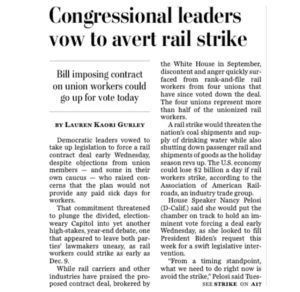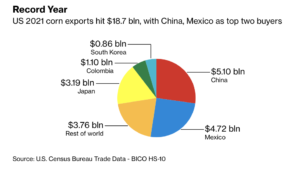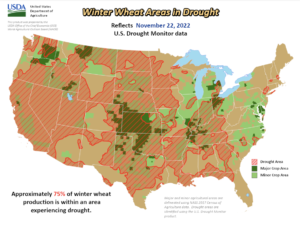Republican U.S. lawmakers plan to create a task force to study potential year-round sales of higher-ethanol E15 gasoline blends in the U.S., after an attempt to pass such legislation in…
Congressional Leaders Pledge Action to Avert Rail Strike; Mexico’s Planned Ban on U.S. GMO Corn Imports Percolates, While U.S. Wheat Condition in Focus
Lauren Kaori Gurley reported on the front page of today’s Washington Post that, “Democratic leaders vowed to take up legislation to force a rail contract deal early Wednesday, despite objections from union members — and some in their own caucus — who raised concerns that the plan would not provide any paid sick days for workers.
“That commitment threatened to plunge the divided, election-weary Capitol into yet another high-stakes, year-end debate, one that appeared to leave both parties’ lawmakers uneasy, as rail workers could strike as early as Dec. 9.”

“House Speaker Nancy Pelosi (D-Calif.) said she would put the chamber on track to hold an imminent vote forcing a deal early Wednesday, as she looked to fill President Biden’s request this week for a swift legislative intervention,” the Post article said.
Writing on the front page of today’s Wall Street Journal, Katy Stech Ferek reported that, “House Majority Leader Steny Hoyer (D., Md.) said Democratic leaders were in the process of counting votes. He declined to say if Democrats would need to have Republican support in order to pass the legislation, but said he was hopeful that the bill could pass on a bipartisan basis.”
Ferek noted that, “Senate Majority Leader Chuck Schumer (D., N.Y.) said he and Mr. McConnell agreed to meet to figure out the best way to hold a vote quickly.
“The bill would need 60 votes to advance in the 50-50 Senate.”
And James Politi, Andrew Edgecliffe-Johnson and Taylor Nicole Rogers pointed out yesterday at The Financial Times Online that, “In September, the White House brokered a tentative pay deal that was supported by union leaders and the railway companies after weeks of intense negotiations.
“However, it was rejected by the workers in four out of 12 affected unions, leading to the prospect of a paralysing strike.”
Elsewhere, Reuters writers Cassandra Garrison and Dave Graham reported yesterday that, “Mexican President Andres Manuel Lopez Obrador said on Tuesday he is seeking a deal with Washington after the United States threatened legal action over Mexico’s plan to ban genetically modified (GMO) corn in 2024.
“After meeting with Mexican officials on Monday, U.S. Secretary of Agriculture Tom Vilsack said Mexico’s decree could violate the United States-Mexico-Canada (USMCA) trade pact.
“Lopez Obrador looked to assuage those concerns during a regular news conference on Tuesday, saying the ban was focused on genetically modified yellow corn for human consumption.”
Also yesterday, Bloomberg writers Max de Haldevang and Maya Averbuch reported that, “Mexican President Andres Manuel Lopez Obrador said Tuesday he is willing to go to a trade dispute with the US if the two countries can’t reach an agreement on genetically modified corn.

“Mexico will allow imports of GMO yellow corn for animal feed over the next two years, while the government studies whether the practice can harm human health, Lopez Obrador, known as AMLO, said at a daily press conference. If the two sides can’t reach an agreement, Mexico is willing to have the case reach a trade dispute under the US-Mexico-Canada Agreement on trade, Lopez Obrador said.”
DTN Political Correspondent Jerry Hagstrom reported yesterday that, “Vilsack said he expects a proposal from the Mexican government soon to resolve the situation.”
In other trade related news, Bloomberg writers Megan Durisin, Volodymyr Verbyany, and Aine Quinn reported yesterday that, “Ukraine is considering a push for larger ships to use its crop-export corridor, in an effort to bolster volumes as inspection lags slow trade.”
“Given the bottlenecks, Ukrainian officials recently held talks with agriculture industry representatives about prioritizing bigger ships, according to Roman Slaston, head of the Ukrainian Agribusiness Council. A proposal was discussed to restrict the corridor to larger vessels: at least 15,000 tons for those carrying bulk grain or oilseeds, and 6,000 tons or more for vegetable-oil tankers,” the Bloomberg article said.
And Reuters writer Anna Koper reported today that, “Around 450,000 tonnes of Ukrainian grain are being transported via Poland monthly, over 50% more than in the middle of the year, Poland’s infrastructure minister said on Wednesday, as Warsaw helps its neighbour to increase its food exports.
“Ukraine is one of the world’s leading grain and oilseed exporters and a Russian blockade of its ports after Moscow invaded the country in February drove a quest for alternative routes.”
Also today, Reuters writer Naveen Thukral reported that, “The U.S. Department of Agriculture, in its last weekly crop progress report for 2022, on Tuesday rated 34% of U.S. winter wheat in good to excellent condition, up 2 percentage points from the previous week and a bigger improvement than most analysts had expected.

“But the USDA’s figure, down from 44% a year ago, was the lowest rating for this time of year since late November of 2012, when 33% of the 2013 crop was rated good-to-excellent. Dry conditions are the main concern. About 75% of the U.S. winter wheat production area was experiencing drought as of Nov. 22, according to the government.”





